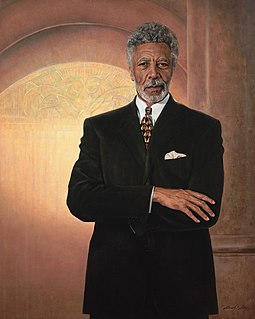A Quote by Noam Chomsky
Suppose Vietnam could separate itself from the American dominated global system and carry out a successful social and economic development. Then that is very dangerous because then it could be a model to other movements and groups in neighboring countries. And gradually there could be an erosion from within by indigenous forces of American domination of the region.
Related Quotes
Why was the United States so afraid of an independent South Vietnam? Well, I think the reason again is pretty clear from the internal government documents. Precisely what they were afraid of was that the "takeover" of South Vietnam by nationalist forces would not be brutal. They feared it would be conciliatory and that there would be successful social and economic development - and that the whole region might work.
Let me just say you could end this violence within a very short period of time, have a complete ceasefire - which Iran could control, which Russia could control, which Syria could control, and which we and our coalition friends could control - if one man would merely make it known to the world that he doesn't have to be part of the long-term future; he'll help manage Syria out of this mess and then go off into the sunset, as most people do after a period of public life. If he were to do that, then you could stop the violence and quickly move to management.
Neoconservatism in all its pomp conceived - in the Project for a New American Century - that, following the collapse of the Soviet Union, the world could be remade in the American image, that the previous bipolar world could be replaced by a unipolar one in which the U.S. was the dominant arbiter of global and regional affairs.
Detroit's financial challenges - the decline of the American auto industry, the impact of the global economic recession, declining population, and an erosion of the municipal tax base - are key to understanding what led this great city to an inability to provide basic city services or to carry out the normal functions of a municipality.
I suppose I was lucky enough to be educated at a time when teachers still thought children could handle knowledge. They trusted us. Then there came a time when they decided that because not every kid in the class could understand or remember those things they wouldn't teach them anymore because it wasn't fair on the less good ones. So they withheld knowledge. Then I suppose the next lot of teachers didn't have the knowledge to withhold.
How then to enforce peace? Not by reason, certainly, nor by education. If a man could not look at the fact of peace and the fact of war and choose the former in preference to the latter, what additional argument could persuade him? What could be more eloquent as a condemnation of war than war itself? What tremendous feat of dialectic could carry with it a tenth the power of a single gutted ship with its ghastly cargo?
We are calling on countries that supply weapons to comply with certain restrictions: not to sell weapons to human rights abusers, not to sell them to governments or groups carrying out aggression against states, not to make weapons sales that could disrupt security or development in the receiving region. These are in many ways common sense principles, but sadly, there seems to be very little common sense in the international arms trade.
I've figured out the secret. Your mind is your power; you have to work with your mind and work with your own thoughts about your own life. If you spend so much time thinking, "This industry is male-dominated. It's sexist. It's this. It's that," then that's what the picture will always be. I remember when I was coming up, I didn't have those thoughts. My mom told me I could be whatever I wanted to be and I could be as bright of a star as I was meant to be. So, that's where I put all of my focus and my thought...into what I could do. And I carry that with me now.





































